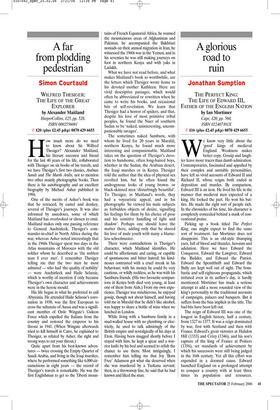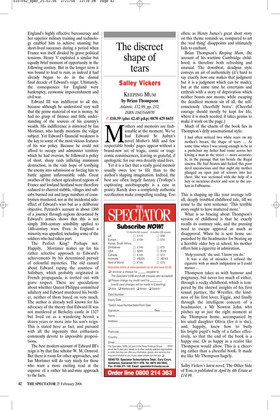A glorious road to ruin
Jonathan Sumption
THE PERFECT KING: THE LIFE OF EDWARD III, FATHER OF THE ENGLISH NATION by Ian Mortimer Cape, £20, pp. 560, ISBN 022407301X ✆ £16 (plus £2.45 p&p) 0870 429 6655 We know very little about the ‘good’ kings of medieval England. Weakness makes better copy. Gossip and laughter leave more traces than dumb admiration. Contemporaries, fascinated and appalled by their complex and unstable personalities, have left us vivid accounts of Edward II and Richard II, whose reigns both ended in deposition and murder. By comparison, Edward III is an icon. He lived his life in the manner that medieval men expected of a king. He looked the part. He won his battles. He made the right sort of people rich. In the chronicles of his time, his character is completely concealed behind a mask of conventional praise.
Picking up a book titled The Perfect King, one might expect to find the same sort of treatment. Ian Mortimer does not disappoint. This is an old-style thumping yarn, full of blood and thunder, heroism and adulation. Here we have Edward the Conqueror, Edward the Lawgiver, Edward the Builder, and Edward the Patriot. Edward the Spendthrift and Edward the Bully are kept well out of sight. The bombastic and self-righteous propaganda, which irritated even in its author’s day, is hardly mentioned. Mortimer has made a serious attempt to add a more rounded view of the king’s personality to the traditional accounts of campaigns, palaces and banquets. But it suffers from the bias implicit in the title. The bad bits have been left out.
The reign of Edward III was one of the longest in English history, half a century, from 1327 to 1377. It was a reign dominated by war, first with Scotland and then with France. Edward’s great victories at Halidon Hill (1333) and Crécy (1346), and his son’s capture of the king of France at Poitiers (1356), set standards of achievement by which his successors were still being judged in the 16th century. Yet all this effort was expended in a doomed cause. Edward launched England on a prolonged attempt to conquer a country with at least three times its population and resources. England’s highly effective bureaucracy and her superior military training and technology enabled him to achieve stunning but short-lived successes during a period when France was itself divided by grave political tensions. Henry V exploited a similar but equally brief moment of opportunity in the following century. But in the longer term it was bound to lead to ruin, as indeed it had already begun to do in the dismal final decade of Edward’s reign. Ultimately, the consequences for England were bankruptcy, economic impoverishment and civil war.
Edward III was indifferent to all this, because although he understood very well that the prime material of war is money, he had no grasp of finance and little understanding of the sources of his country’s wealth. His indifference is mirrored by Ian Mortimer, who hardly mentions the vulgar subject. Yet Edward’s financial weakness is the key to some of the most vicious features of his war policy. Because he could not afford to occupy and administer territory which he had overrun, he followed a policy of short, sharp raids inflicting maximum destruction, in the vain hope of terrifying the enemy into submission or forcing him to battle against unfavourable odds. Great swathes of the richest agricultural regions of France and lowland Scotland were therefore reduced to charred stubble, villages and suburbs burned out and large numbers of countrymen murdered, not as the incidental sideeffect of Edward’s wars but as a deliberate objective. Petrarch’s account in about 1360 of a journey through regions devastated by Edward’s armies shows that this is not simply 20th-century sensibility applied to 14th-century wars. Even in England a minority was appalled, including some of the soldiers who had taken part.
The Perfect King? Perhaps not. Happily, Mortimer makes up for his rather selective approach to Edward’s achievements by his determined pursuit of colourful mysteries. The old canard about Edward raping the countess of Salisbury, which probably originated in French propaganda, is trotted out with grave respect. There are speculations about whether Queen Philippa committed adultery and Edward murdered his brother, neither of them based on very much. The author is already well known for his advocacy of the theory that Edward II was not murdered at Berkeley castle in 1327 but lived on as a wandering hermit a dozen years or more into his son’s reign. This is stated here as fact, and pursued with all the ingenuity that enthusiasts commonly devote to impossible propositions.
The best modern account of Edward III’s reign is by that fine scholar W. M. Ormrod. But there is room for other approaches, and Ian Mortimer will do very nicely for those who want a more exciting read at the expense of a rather hit-and-miss approach to the facts.



































































 Previous page
Previous page